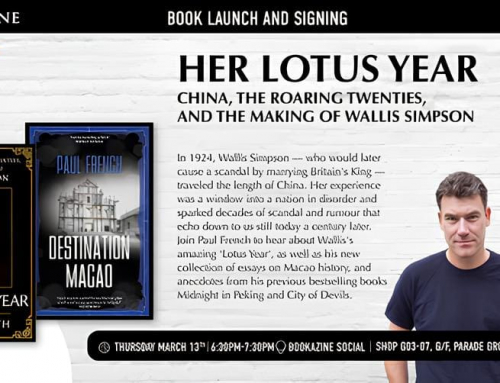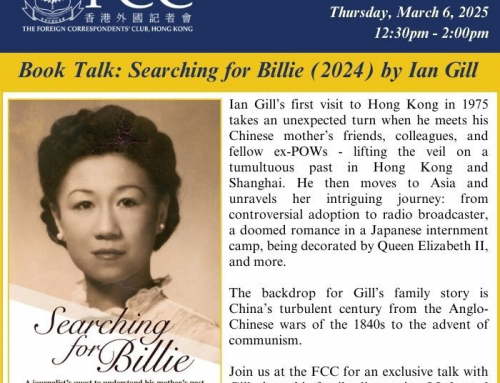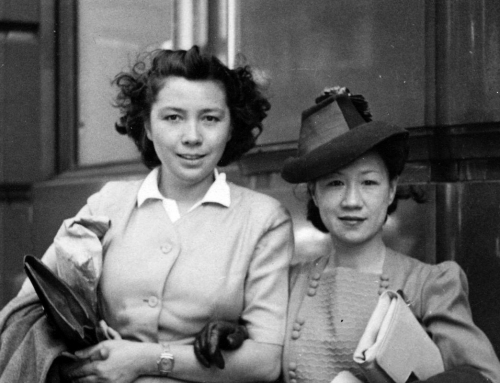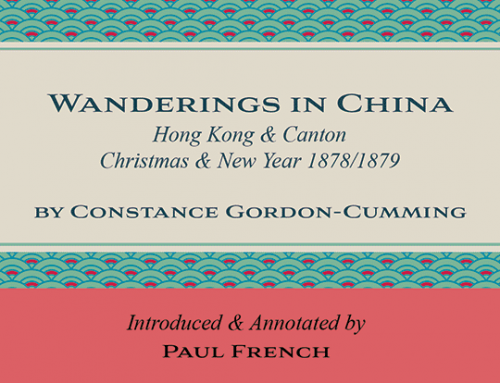 Our newest book, Hong Kong Noir: Fifteen true tales from the dark side of the city, has been on the South China Morning Post‘s top five bestseller list since Christmas. Author Feng Chi-shun has been interviewed by RTHK Radio 3 and HK Magazine, and the book has been reviewed by Susan Blumberg-Kason, the SCMP and Asia Times, which said:
Our newest book, Hong Kong Noir: Fifteen true tales from the dark side of the city, has been on the South China Morning Post‘s top five bestseller list since Christmas. Author Feng Chi-shun has been interviewed by RTHK Radio 3 and HK Magazine, and the book has been reviewed by Susan Blumberg-Kason, the SCMP and Asia Times, which said:
Who can resist a story told by a pathologist about a hemophiliac, Ah Fai, who chooses to join the notorious 14K triad at the tender age of 15 and enjoys nothing more than the bloodletting of a full-on, violent street fight?
As you might guess, Ah Fai spends a lot of time in the intensive care unit of hospitals, where his striking good looks and unusual charm make him something of a celebrity to the doctors and nurses who treat him. Their affection for the reckless gangster spurs them to work especially hard to save him every time he shows up awash in his own blood at an emergency ward. In the end, however, it turns out there is only so much anyone can do for a hemophiliac who has made such a poor career choice.
We print this story below.
The Hemophiliac
Hemophilia: A hereditary disease characterized by a defect in the clotting of blood.
Hemophiliac: A person who suffers from hemophilia.
Every story about a hemophiliac is worth telling.
This is the story of a young man, Hong Kong born and bred, who suffered from hemophilia from birth and died of its complications at the age of 25.
Hemophilia is a disease which teaches medical students more about genetics than all others. The pathogenesis of the disease is the deficiency of a clotting agent in the blood (a “Factor” in medical vernacular) known as Factor VIII.
Although other “Factors” in our blood are known to be deficient, some congenital, some acquired, hemophilia remains the most famous and fascinating.
Hemophilia is a disease like no other. It is one of the first diseases discovered to be connected to the sex chromosomes (a sex-linked disease, in medical terms). The gene responsible for producing Factor VIII lies in chromosome X. If the gene is defective in a female, chances are she won’t be affected because she has another X chromosome as a back-up (except in consanguineous marriages, when both X chromosomes may be affected.) There is no back-up in a male, because his other sex chromosome is Y.
The fact that it affects males almost exclusively makes one think it is nature’s way of bringing equity to both sexes by compensating women for having exclusive female conditions such as menstruation and childbirth. But then again it is not, because the misfortune of a son causes despair to his mother more than anyone else.
A Jewish mother in ancient times watched her newborn sons die of post-circumcision bleeding one after another. It was only after the death of her fifth son in succession that her Rabbi would finally relent and grant her exemption from the religious rite of circumcision.
A hemophiliac tends to bleed non-stop from the slightest cut and the mildest bruising. Blood transfusion has been known to be effective in stopping the bleeding since time immemorial – hence ‘love of blood’ has become the disease’s nickname.
The life of a hemophiliac is never easy. The mainstay of treatment is the replacement of Factor VIII. In ancient times, it was achieved by whole-blood transfusion, and more recently by other blood components such as plasma and cryoprecipitate derived from frozen plasma. Blood transfusion is time-consuming and cumbersome, laden with inherent risks, and disruptive of the lives of the hemophiliac and his family. The narration of the trials and trepidations from parents taking care of a hemophiliac child is material worthy of a Pulitzer Prize.
In later years, scientists found a way to produce Factor VIII concentrates en masse, first from a large pool of plasma from thousands of donors, then more recently by genetically engineered methodologies. Such products improve a hemophiliac’s life tremendously because of their ease of administration, as most cases no longer require hospitalization.
Older blood products carried the risk of having been contaminated with viral diseases, such as hepatitis or HIV AIDS. Thousands of hemophiliacs have died of these infectious diseases over the years. The disease carries other complications as well, involving bleeding into joints and body cavities.
One relatively rare but deadly complication is the development of antibodies to Factor VIII, a result of repeated injection of Factor VIII replacement therapies. Having this complication means that no matter how much Factor VIII is poured into the patient’s circulatory system, it is ‘neutralized’ or ‘inhibited’ by the antibodies whose levels rise further when challenged by the injection of high doses of Factor VIII.
In recent years, the outlook has become rosier for these patients because of the invention of a blood product that bypasses the Factor VIII in the clotting process. But in the late 1980s, before this product was available, hemophiliacs who had developed the Factor VIII antibodies in their immune systems could do nothing but wait to die. That was what happened to the protagonist of this story.
* * *
Ah Fai was born in 1964. He grew up surrounded by women. He and his maternal grandmother, mother, and two older sisters all lived under one roof. All other male family members had died young. The father died in a car accident when Ah Fai was four. The grandmother had four children, but all three of her sons died at a young age because of mishaps involving terminal bleeding. Though not well educated, the grandmother told Ah Fai’s mother, her only surviving child, that their side of the family was cursed by a bleeding disease that afflicted men and men only.
When Fai was a newborn, his grandma went to Wong Tai Sin temple to make offerings to the gods in exchange for Ah Fai’s protection from the same bleeding curse. It seemed to have worked until Ah Fai was ten years old and had a tooth extraction. He bled for days until he was hospitalized and treated in Queen Elizabeth Hospital. After a battery of tests, the diagnosis of hemophilia was confirmed. He was given Factor VIII concentrates to stop the bleeding. The attending doctor spoke to Ah Fai and his mother at length before his discharge about the nature of the disease, what to avoid, and what to expect.
Ah Fai was a little spoiled to start with, and when he found out that he was a hemophiliac and probably would have a short life expectancy, he became impossible to live with. All family members treated him with kid gloves. He was manipulative, especially with his grandma, and often got his way with her by threatening to cut himself with a knife or banging his head against the wall. But he could be very amiable and charming if he chose, and all the women in the household adored him.
A spoiled child like Ah Fai often evolved into a school bully, until he encountered someone more roguish than he was, such as a ‘big brother’ of a triad society. Ah Fai was recruited into a 14K triad gang at 15 and got involved in many triad activities.
He had many fights, and ended up in the hospital often because of bleeding into his joints – the knees and elbows were most affected. He realized then if he was to survive as a triad member, he needed to use weapons, and he needed to strike before being struck. He soon developed a reputation for ferocity and ruthlessness in the street, and was much feared. He also built up a rap sheet longer than a bamboo stick.
He lived life in the fast lane. When not engaged in nefarious activities, he would be in and out of jail or hospital. He became a ruggedly handsome young man, cool and charismatic. He had no problems getting girls, and had a string of girlfriends. Like most triad members, he had two categories of women: the pretty ones who became girlfriends and mistresses, and plain ones to be candidates for marriage because they were more likely to be submissive and loyal wives.
He married a homely girl who quickly bore him twin sons. He knew enough about hemophilia that he would not pass the disease to his sons. Charming as usual, especially towards his family, he told his grandma that he was doing this for her, so that she would finally have male descendants who would not die young.
Over the years, because of his violent lifestyle, Ah Fai had received as many as 50 doses of Factor VIII concentrates. They are made of human proteins capable of eliciting an antibody response from the immune system. He was found to have developed antibodies to Factor VIII on one of his visits to the Prince of Wales Hospital after a street fight in Sha Tin. He had led a fight to chase away a rival gang to corner the illegal drug trade in a disco. He chopped two of the rival gang members but was kicked in the left knee, which swelled up like a balloon. The response to treatment was unsatisfactory and his doctors suspected the presence of counteracting antibodies. Blood tests confirmed this. Lucky for him that time, the knee cavity, being a confined space, allowed only a finite amount of blood inside. Also, the antibody levels were relatively low then. Before his discharge, his doctor warned him he might not be as lucky next time if the bleeding was from somewhere else.
Ah Fai had two options: quit the triad lifestyle and avoid fights; or risk his life carrying on. Quitting a triad society is never easy. By then, he was ranked a red pole and had an army of followers whose livelihood depended on triad businesses which he oversaw. He had also built up enemies whose only reason not to retaliate was because he was surrounded by his army of followers. Quitting would render him a lone and easy target.
Meanwhile, Ah Fai faced more pressing matters. The dragon heads of the two rival triad factions were conducting talks. They met and spoke about the age-old triad mantra: peace brings prosperity for all parties concerned. The only sticking point in the negotiation was that the two gang members Ah Fai chopped were still in the hospital recovering, might suffer permanent disabilities, and had to be compensated. In triad culture, compensation means money or the alternative of physical violence in retaliation. Ah Fai’s dragon head wasn’t about to hand over a big chunk of money, so Ah Fai became the sacrificial lamb.
Late one night, he was ambushed after a snack in a dai pai dong. Someone must have tipped off the rival gang to his whereabouts because the assault was well organized and expertly executed. Ah Fai had five of his sai los with him but he was the main target, and the only one chopped. He tried to fend off his attackers but was hopelessly outnumbered. Apart from wounds to his arms and legs, he also suffered a gash on his back. His sai los took him to the Prince of Wales Hospital where the emergency room doctor knew him well. He took one look at Ah Fai’s wounds, sighed, and shook his head.
Ah Fai was almost in shock from the bleeding. He was started on blood transfusion right away. Meanwhile he also received wound care, including sutures and pressure dressing. Doses of Factor VIII concentrates were given. Blood tests were ordered to determine the levels of his anti-Factor VIII antibodies. Unfortunately, they had become sky high.
Active bleeding was controlled, but blood continued to ooze from the wounds. An X-ray of the lungs showed a collection of blood in the right chest cavity, indicating the chop wound on the back had most likely punctured the lung tissues. Surgery was out of the question until the bleeding was controlled.
The only way to slow down the bleeding was to keep pouring Factor VIII concentrates into his blood stream, and transfuse him with blood when the blood count dropped too low.
Ah Fai was transferred into the intensive care unit because his condition was unstable, and close monitoring of his vital signs was required. Visiting hours were restricted. Ah Fai suspected that he was set up for the assault by his own triad brothers, and was indignant and bitter at their betrayal. He did not want any visitors except his grandmother. All others were turned away. When she visited, she did all the talking. Ah Fai simply closed his eyes and listened to her prattling on.
He didn’t say much to anyone in ICU. Doctors came a few times a day and updated him on his situation. He nodded in acknowledgement, no questions asked, and no expression of gratitude, anger, or feelings of any kind.
He was a handsome man, and in spite of his violent past, he could turn on the charm and become sweet and gentle. All the nurses loved him, and treated him with extra tenderness. Dressings were changed regularly and expertly. Kind words were offered, albeit without much of a response.
Ah Fai could possibly be kept alive for months if the same treatment regime was maintained. There was one problem, however. Factor VIII concentrates – the drug that was keeping him alive – were expensive, and the dosages he needed were astronomical. After two weeks, the hospital’s budget for emergency drug supply for the whole year was exhausted. Extra money was applied for from the health authority, but it would be only a stop-gap measure.
All the department heads, the dean of the medical school, and the medical superintendent at the Prince of Wales Hospital got together for an emergency meeting. They decided Ah Fai’s condition was incurable, and the treatment was wasteful, futile, and unsustainable. The collective decision was to stop the treatment and wait for a miracle or the inevitable. A team of three senior doctors was charged with breaking the news to the patient.
Dr. Chiu, the Medical Consultant in charge of the ICU, did most of the talking. He saw Ah Fai most often, and thought he had some kind of rapport with his famous patient. After a preamble, and a reiteration of Ah Fai’s condition, including the theory involving development of antibodies in the immune system in layman’s terms, he dropped the bombshell. He said: “The hospital is running out of options, we don’t have the resources to obtain any more of the Factor VIII we have been giving you, so we have no choice but to stop.” He was careful not to use the word “money”.
Ah Fai was more succinct: “Then what will happen to me?”
Dr. Chiu: “Your bleeding will become more severe, especially inside your chest cavity, which is getting worse even now.”
Ah Fai: “That means I’ll die soon.”
The doctors all dropped their eyes to focus on their shoes. One of them said yes, almost inaudibly.
Dr. Chiu said quietly: “Any other questions?”
Ah Fai shook his head, and closed his eyes – a signal for him to be left alone.
An hour later, Ah Fai called for Dr. Chiu. He came right away.
Ah Fai asked: “How much time do I have?”
Dr. Chiu: “You had your last dose of Factor VIII at 4.00pm, and that was about two hours ago. If you don’t get the next dose, right about now, I reckon you will have difficulty breathing in three to four hours.”
“Doctor, I have one final request. If you still have some more of that Factor VIII, give me one last dose, and call all my family to come here. I want to talk to them before I go. Some of them live quite far away, so I need more time.”
Dr. Chiu called the pharmacy and told the dispensers to empty their stock of Factor VIII.
Ah Fai asked to see his wife first. The wife was sobbing uncontrollably. Ah Fai told her to bring up the two boys the best she could, and never let them become involved with triad societies. The wife begged him not to talk like that. He would get better in no time, and could go home to spend time with his two boys soon. Ah Fai stridently told her to shut up. If he would get well soon, why was she weeping like a widow at her husband’s funeral?
Next he summoned his two sisters. He beseeched them to help bring up his two sons.
The mother was next. He asked rhetorically: “Mom, why did you give birth to me? I hate you.” The mother broke down and cried. Ah Fai relented and said: “I was only joking with you. You know I don’t hate you. It’s my destiny, and yours. At least you have two very good daughters who will take good care of you in your old age. I’m useless to you. I’m sorry.” The mother cried some more.
The grandmother was last. Ah Fai asked her to help bring up his two boys, but not to spoil them like she had him. He wanted them to become good people. Grandma said Ah Fai had always been a good boy. Ah Fai said: “Maybe only to you.”
Then he asked her to sing the lullaby he had heard many times from her as a child. The song was called “The best thing in life is having mama”. But Grandma had her own version, she started singing softly: “The best thing in life is having grandma …” She became too choked up to continue after the first verse. Ah Fai held her hand and closed his eyes.
There was not a dry eye in the ICU. All the nurses knew their famous patient well. Many had given him baths, changed his dressings, or were otherwise involved in his care, and had talked to him in the past few weeks. Everyone knew he would be gone in a few hours. It was heartbreaking and surreal to watch a vital and alert young man, with eyes wide open staring up at the ceiling, not complaining, not showing much emotion, but fully aware of what would happen soon.
None of the nurses had the courage or inclination to talk to him in the next few hours. What could one say in such a situation, anyway?
The family gathered in the waiting area. The mother and grandma huddled together and cried in each other’s arms. The wife was wailing non-stop. The two sisters sobbed quietly and busied themselves passing out tissues to other family members.
The nurses didn’t feel comfortable checking on him too often. He was hooked up to a cardiac monitor and his demise would be conspicuous.
The monitor showed that Ah Fai’s heartbeat rose to over 100 at 11.00pm that night. It climbed to 120 at midnight, 180 at 2.00am. After that, it became weak and erratic with short periods of no heartbeat at all. His heart finally stopped beating altogether at around three o’clock, and the monitor at the nurses’ station made the customary prolonged uninterrupted beep – indicative of a cardiac arrest.
Unlike other cardiac arrests, no one rushed to the patient to perform resuscitation. Instead, all the nurses on night shift rose to their feet and hugged one another, with tears streaming down their cheeks.
Ah Fai kept his composure the whole time. He didn’t make any fuss; he simply laid quietly and still up to the last moment.
When his heart stopped, so did his blood which, instead of roaring furiously through his vasculature, became lifeless and motionless, just like Ah Fai. Long rest his bad blood – the genetically defective elixir that had sustained his short life, but had also caused him a lot of grief, and eventually premature death.





Leave a reply